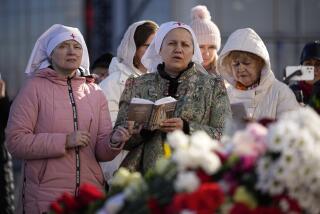Showdown in Russia Dissipates Into Insults : Feud: Yeltsin calls foes’ efforts ‘a farce.’ Would-be president Rutskoi remains isolated inside Parliament.
- Share via
MOSCOW — The historic showdown ignited five days ago when President Boris N. Yeltsin dissolved Russia’s Parliament fizzled Saturday into an exchange of theatrical insults as many lawmakers left their besieged and barricaded headquarters and headed home.
The slow death of the Congress of People’s Deputies moved the focus of resistance to Russia’s regional legislatures, many of which are threatening to withhold taxes and block Yeltsin’s plan for election of a new Parliament in December.
Lacking a quorum of its 1,031 members, the Congress skipped a planned Saturday session and met in small, dispirited groups. To prolong the image of defiance, the man they named Russia’s acting president, Alexander V. Rutskoi, reviewed a scraggly paramilitary formation of 250 “Defenders of the Parliament” outside on the chilly, wind-swept banks of the Moscow River.
Rutskoi, 46, an air force general and Afghan War hero, surprised hundreds of riot troopers deployed around the huge Parliament building by touring their checkpoints with an appeal to stop following orders from Yeltsin and his military commanders, whom he labeled “scumbags” and “criminals.” The troopers just glared.
Yeltsin replied with a televised interview mocking the conservative resistance as “a disgraceful farce . . . the last gasp.”
After more than a year of paralyzing feuds over his free-market reforms, the 62-year-old Yeltsin stunned the world Tuesday with his admittedly unconstitutional closure of Congress, spurring it to begin a defiant session and to “replace” him with Rutskoi, his vice president and former ally.
But Yeltsin managed to keep the armed forces, the bureaucracy, Russian public opinion and Western leaders on his side, while cutting off the deputies’ salaries, perks, office telephones and electricity; closing their newspaper, and denying them television time.
Even so, Rutskoi has made the marble Parliament building, known as the White House, a symbol of resistance. He stalks its darkened halls with a candle and brands Yeltsin a “fascist dictator” while as many as 4,000 supporters rally outside each day behind barricades made of concrete blocks, steel pipes and other debris.
But by the weekend, with the building’s water shut off and the lawmakers’ cellular phones jammed by powerful radio signals, many deputies were ready to quit. A decisive moment came Saturday at noon, checkout time at the adjacent Peace Hotel, when public funds paying their room bills ran out.
“I think we have fulfilled our duty. We have removed the president,” said Aman Tuleyev, a deputy from Siberia, arguing that it was time to go home and rally support among constituents.
An estimated 200 of the more than 600 deputies who voted to impeach Yeltsin remained at the White House on Saturday night, many sleeping in their offices. “I will stay here until the end and will not leave of my own will,” declared Vladimir Isakov, one of the die-hards.
Parliament Chairman Ruslan I. Khasbulatov suggested Saturday that “the center of legislative authority” be moved to some other city. Leaders of at least 40 of Russia’s 89 regional and republican legislatures are already set to meet today in St. Petersburg to debate Yeltsin’s moves.
Twenty-nine of those bodies have signed an ultimatum threatening to withhold taxes and block rail and highway transport to Moscow starting Monday unless Yeltsin rescinds his decrees and schedules presidential elections at the same time as the ones for Parliament. Yeltsin has set presidential elections for June 12, six months after a new legislature is elected.
An aide to Rutskoi said Prime Minister Viktor S. Chernomyrdin is taking the threat seriously and is working behind the scenes to reach a compromise. The head of Yeltsin’s election commission and a member of his advisory council suggested that such a deal is possible. Both endorsed the idea of simultaneous elections, as did former Soviet President Mikhail S. Gorbachev.
But Yeltsin, in his television interview, said the power of regional legislatures is overblown, and he vowed to disband any that resist him. He announced that he had already fired the executive administrator of Bryansk province for opposing the shutdown of Parliament.
Rutskoi and Khasbulatov also insisted, at least in public, that there could be no middle ground, no graceful exit from the confrontation.
“They are making proposals already to me to compromise,” Rutskoi told the crowd, which immediately roared its disapproval. “They say Boris Nikolayevich (Yeltsin) will then cancel his decree. We here say, ‘No, no and once more no!’ ”
Even with lawmakers leaving, the crowd outside the White House--a mix of Communists, nationalists, monarchists and anti-Semites seeking to restore the Soviet Union--poses a lingering threat of violence that could destabilize this huge nation in the throes of a painful economic transformation.
One of Rutskoi’s army backers and nine other people have been charged in the slaying of a police inspector and an elderly bystander in a raid on a military headquarters Thursday night. Rutskoi’s paramilitary “Defenders of the Parliament” openly wielded AK-47 assault rifles and Molotov cocktails until Friday, when Yeltsin ordered police to put a loose cordon around the place but refrain from attack. The weapons are believed to be stashed on the premises.
When “Defenders” drilled on the White House grounds Saturday, the only weapon in sight was a ski pole. About a dozen of the troopers wore complete military gear. Others wore parts of uniforms--World War II helmets, tall woolen Cossack hats, backpacks, anything khaki. Ranging in age from their 20s to their 70s, they marched in disorderly formations but high spirits.
“You came here to defend the honor and dignity of the Soviet people,” Rutskoi told them.
Censors at state-controlled television let the scene air without comment.
Andrei Ostroukh of The Times’ Moscow Bureau contributed to this report.
More to Read
Sign up for Essential California
The most important California stories and recommendations in your inbox every morning.
You may occasionally receive promotional content from the Los Angeles Times.













